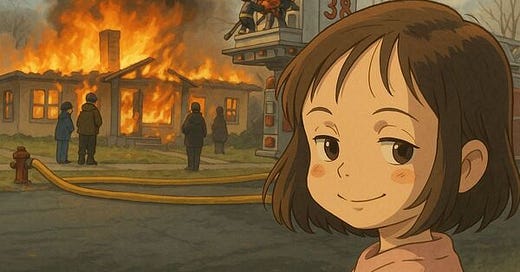One thing that’s been provoking a noticeably larger share of the internet’s vomit emojis recently is OpenAI’s update to its image generation capacities that allow it to create Studio Ghibli-styled AI.
The controversy is complicated.
First off, Miyazaki himself allegedly called AI “an insult to life itself,” and many people are citing this. Upon a little research, it looks like Miyazaki made that comment about a different kind of AI videogame technology back in 2016 that turns human movement into disfigured zombie galumphing. You can watch the full video here.
In other words, there are a lot of narratives out there, and I’m not 100% sure how Miyazaki feels about the current state of AI, but the point is that this use of Studio-Ghibli-style AI has become another flashpoint for debate.
In my mind, the objections to AI-generated images come in two forms, though both are interrelated. People object for reasons 1) aesthetic and 2) moral.
I think the aesthetic objection is that AI-art is offensive because it’s so bad as an art form, and this was true years ago. I think that the reason this objection still strikes a chord, even when AI technology has advanced impressively, is because innovators and early adopters touted it very early on as a replacement for film. There was a kind of tech hubris that reduced the medium of cinema to “slop” images, putting the two on the same playing field.
A little anecdote: Back in November of 2022, just weeks before ChatGPT was released, I attended a film festival in San Francisco called the “Holl-AI-Wood AI Film Festival” put on by The Culture Dao, which brands itself as a “guild of AI filmmakers and gamemakers.”
At the event, there was a general buzz and excitement around AI and its creative potential. More particularly, I was struck by the kind of hubris that permeated the whole festival.
Edward Saatchi, cofounder of Fable Studio and AI hawk, opened the festival with a presentation that had some interesting notes of “stick it to Hollywood.”
Saatchi lamented Silicon Valley’s artistic decline as it was once a creative animation hub. He said:
In San Francisco, we used to be at the center of gaming and cinema. George Lucas set up shop here. It’s been quite a long time since we’ve been at the center, and I think we have the opportunity now to do it, to bring the Valley to the forefront of filmmaking and gamesmaking.
I found Saatchi’s presentation pretty bold. Netflix, which really started as a tech company, had already disrupted distribution and had permanently changed the economics of filmmaking with streaming. Now, Saatchi was claiming that the very content and creative process of filmmaking would also be disrupted by tech.
So, to return to our moment, I think much of the outrage around Miyazaki emulations and other AI experiments comes out of people pushing back against this hubristic ethic of disruption characteristic of Silicon Valley. Move fast and break things. Uproot systems and processes and skip over all the drudgery and labor if possible (this ethic is also bringing some havoc to our government now).
After all, many complain about the Ghibli imitations because Miyazaki’s art form was defined by the hard labor of animators.
One X user complained that OpenAI’s imitations abuse Miyazaki’s work and “the work of all of the artists who painstakingly created these works using hand-drawn animation for which the style is known.”
So Silicon Valley tries to create efficiency and streamline at the same time that traditional artists want to emphasize that their labor is important. And maybe the very LACK of efficiency in the animation process is part of what gives it its value.
Honestly, I’m not sure where I stand on all of these points. But it does bring me to the nature of the second objection that people have against OpenAI: the “theft” of the thing.
This point boils down to economics. In a time when the film/animation industry is struggling, an artist’s compensation is an especially sore point. And the fact that so much labor went into Studio Ghibli’s films, and OpenAI pays nothing to hoover up those images, feels especially unethical. Artists are facing economic crisis and OpenAI was just valued at a whopping $300 billion.
So, given the industry’s tough spot, it’s no wonder people are in convulsions. Even if Miyazaki is being somewhat misquoted, the point still stands: artists should be fairly compensated in this brave new world of AI.
And to jump back to Holl-AI-Wood for a second, there was something very funny about all that disruptor talk that night.
When the lights came down and the short films started playing, I was appalled at how bad the final products were. The films were choppy, disjointed, abstract, and incoherent. It was a technology in its infancy that didn’t seem to merit the AI-hawkishness that Saatchi brandished on stage. Maybe he was talking about the future. Still, it felt pretty ironic.
I couldn’t sit through all the slop and so I left early. And I did feel nauseous towards the end, but likely because of the greasy popcorn, and not the AI.





